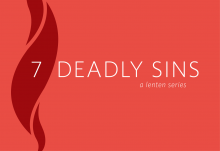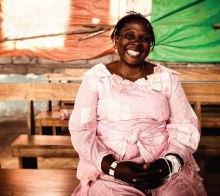joy

I didn’t realize the promise I vowed to myself — to never to live out of step with my values, to always live with passion and bring life into the world — would be a tall order; an impossibly high standard that could turn into, “I need to do and experience everything as quickly as possible so that I don’t waste time.”
Over the past 10 years, this experience developed an impulse to “hurry up” and “do more.” I overextended myself in too many activities the next few years, developed an anxiety and depression disorder, and shamed myself for living in this anxious state when I “should” be living it joyfully to the full.
Through therapy and medication, I got much better, but was still lusting after experiencing everything. Time never seems to be on your side when you’re living like you might die tomorrow. Life never seems long enough when you act like it will stop at the same minute as your heart, forgetting about all I’ve been taught about life after death.

THE SEASON AFTER Pentecost is a challenge. Some churches call it “ordinary time.” This is where most of our life is lived, spiritually speaking. The fact that other churches call it “the season after Pentecost” reminds us that a miraculous tongue of fire is needed for any sermon to work—and the Holy Spirit has a tongue of fire for us. Pentecost propels us through ordinary time. The Holy Spirit can take as sorry a lot of losers as the ones Jesus chose as disciples and turn them into apostles, martyrs, world-changers. God has always done more with less-promising material.
A retreat at a monastery gave me a glimpse of what ordinary time means. By the time 8 a.m. Mass rolls around, we’ve already been in church three times that day. Mass is beautiful, we leave buoyantly, the Trappist monks are nearly chatty. Then the bell rings. It’s time for Terce, another hour of prayer. That bell sets me to sighing—weren’t we just in church? Terce is like the Sunday after Easter or Christmas—a letdown. Same building, half full of people, and with a quarter of the energy. And it is precisely then that it’s important to worship God. The church’s worship of God carries on when we’ve all gotten bored or tired. Such worship is good for souls. Preachers’ souls included.

If you listen, each bucket has its own special sound. First are the empty buckets and their muted ting of dripping sap falling straight to the galvanized steel bottom. Next is the dop that reverberates from the slightly sweet drop running off the spile to a thin layer of liquid below. But it is the soft, and all too rare and timeless plop that I wait for. That quiet plop (or sometimes plip) signals that over half of that the three-gallon bucket is full and the tap is giving in abundance.
There is a slight quickening of the heart when the bucket is heavy enough to need two hands to pull off the hook. Then an involuntary smile to hear the pitch of the shwoosh ascend as the smaller bucket presents it’s offering to the larger. But sometimes, before I touch the bucket at all, I stop and wait to hear what it has to say. Ting? Dop? Plip? Plop?
I look at the tree and then its neighbors. I strain to hear the rhythm of the buckets around me and wonder, what makes one tap run so well when others are nearly dry?

On a Sunday when the dominant color in Christian churches is pink — a symbol of joy for the third Sunday of Advent — I was wearing a black shirt, black pants, and a blue tie. Others in our congregation were wearing various combinations of black or blue.
This was a modest way of showing solidarity with African Americans and a reminder that “Black Lives Matter” while still showing empathy for the police in the Madison, Wisconsin, area who have worked hard over the years to have a diverse force that works to serve rather than dominate the varied racial and ethnic communities that exist here.
But even with a nod to the pressure police are under these days, the dominant focus was on the series of killings of unarmed black people. And we know that not all police departments have made the same efforts that have happened here over a generation — and that our police departments are not perfect either.
The movement to wear black on December 14 came from several African-American denominations across the nation. Here in Wisconsin, Rev. Scott Anderson, Executive Director of the Wisconsin Council of Churches, joined faith leaders in urging people to wear black to church on that Sunday.

For the past several years, I have been less outwardly celebratory during the Christmas season. No wreaths, trees, or bad sweaters for me; I have chosen to be introspective during the end of the year season in order to keep my focus on the true meaning of Christmas. This has become increasingly difficult, as the process of commercializing the celebration of Christ’s birth begins right after Halloween and extends itself until after the nation celebrates the life of Dr. King in January. This year, it has been increasingly difficult to concentrate on this Season of Advent in light of all of the anger and protests going on around the country. The protests over grand jury decisions in both the Michael Brown (Missouri) and Eric Garner (New York) cases and the heartbreak and anger over the deaths of Tamir Rice (Ohio) and Akai Gurley (also in New York) have served for me as a reminder that we need to rally around life.
Many of those critical of the decisions in these cases say that black lives do not matter, and there is some validity to that in a nation that has never truly been delivered and healed from the effects of chattel slavery. Those on the other side say that these cases have gone to the judicial system and that the system should be respected, the issue dropped, and that personal responsibility is the mindset that will move the nation forward. While there is truth in both of those opinions, I am led to think of the joy the families of these dead men and boys must have felt at their birth – a moment of endless possibilities – and I also think of the finality – the end of chances represented by their deaths.

It’s interesting how the word “grace” gets used a lot, even by those who don’t necessarily consider themselves religious. It’s a favorite name for a character that represents someone who is a gift to us — I’m thinking about Bruce’s girlfriend Grace in Bruce Almighty, or Eli’s reassuring encounter with a woman named Grace in the second season of the TV series Eli Stone.
You can probably cite many more examples of characters named Grace in different movies, television shows, and books.
We like to put flesh-and-blood on the notion that we are recipients of some great gift that arrives unexpectedly and is given freely. Someone or something that comes into our life and significantly changes it for the better in some ways.
But what is grace? Who is grace to us?

The television show Castle involves a mystery writer (Richard Castle) who helps a New York City homicide detective (Kate Beckett) solve tough cases. Beckett decided to become a police officer after her mother, a community activist, was murdered and the case was never solved.
In one episode, Castle notices that Beckett keeps a stick figure in the top drawer of her desk at the precinct. It’s odd-looking. The sticks that form the limbs don’t match exactly. The head looks like one of those football-shaped coin purses. It’s all held together by what appears to be seaweed and twine.
Castle wants to know the story behind it.
Beckett tells how on the day of her mother’s funeral, she was really sad so her father took her to Coney Island, one of her favorite places. They walked along the beach in their funeral clothes for a long time. It became a special time for the two of them.
At one point, they decided to gather items that had washed up on the beach and they made the stick figure.
So, why does she keep it in her drawer?
“He’s a reminder,“ Beckett says, “that even on the worst days, there is a possibility for joy.“

I was among millions across the globe wrapped up in the glee of Pharrel William’s song, “Happy.” I first heard it while watching Despicable Me 2 with my family last year. As the credits rolled I remember making a mental note to add it to my workout playlist.
Pharrel even released a 24-hour video of the song on YouTube for millions to enjoy globally – creating a sort of time released happy capsule that was just a click away.
I thought about how this “Happy” anthem struck a chord in our world’s collective unconscious. “Could it be a sign that all of us, the human family, crave deeper joy and some levity?”
I think faith-based communities can discuss this for years to come at a time where joy is a necessity more than a luxury, and ministers are flaming out quicker than ever, and according to a New York Times article, suffer from depression “at rates higher than most Americans.”
Maintaining a sense of joy is then vital for my own work, especially since I lean toward New York-bred cynicism and incredulity. Activism can be rewarding, yet also extremely discouraging at times. Change can seem incremental at best, and the issues are much bigger than any one person or institution can handle. Making joy a vital ingredient in the active life of faith, within the soul of activity.
I’ve been considering three approaches in cultivating joy, a God-given, buoyant energy, in the midst of some weighty work.

As the Father has loved me, so have I loved you. Abide in my love. If you keep my commandments, you will abide in my love, just as I have kept my Father's commandments and abide in his love. These things I have spoken to you, that my joy may be in you, and that your joy may be full. This is my commandment, that you love one another as I have loved you. Greater love has no one than this, that someone lay down his life for his friends. – John 15:9-12
War is always ugly. The loss of innocent lives is never easy to swallow. And yet, as tanks open fire on the humble homes of the Gazan poor and rockets rain down on a terrified Israeli populace we are compelled to ask, “How do we keep coming back to this profane and violent place called war?” Why do we consistently and continually fail to understand the simple principles of our own faith and the faiths of those who profess a belief in God?
These simple faith principles speak of a command to love one another and to have a deep and abiding respect for all life – especially innocent life. Then, why do we fail to love justice, peace, and mercy as God commands and seem so determined to visit such violence and destruction on our world and on one another?
Similar questions arise for me in my work as a pastor who labors in organizing people of faith to contend with the tough issues that we face daily in our country. Issues like the mass incarceration of our young, the struggle for human dignity by the poor, the lack of employment opportunities for those who desire only to feed their children and raise their families, and the millions who yearn to step out from the shadows of unjust immigration laws and be recognized as cherished citizens of an open and welcoming nation. These are the tough issues that bring me and so many other clergy and people of faith from the confines of the church into the streets and homes of those whose lives are tethered closest to the pain of injustice. In each of these instances the moral challenges seems so clear but the outcomes are incongruent with the faith principles that are designed to guide our hearts and direct our actions.

How do you talk about joy in times like these and not sound like a traveling salesman with a bottle of snake oil up his sleeve?
Recently, I received word that Robert Gittelson, the cofounder of Conservatives for Comprehensive Immigration Reform, had died suddenly from a massive heart attack. Over the next seven days, the prolific 63-year-old comedian and actor, Robin Williams, committed suicide, and revered screen legend, Lauren Bacall, passed away at the age of 89.

You can smile at someone, but you can’t really smile with someone until you’ve cried with them, too. Shared their pain, their doubts, their questions, their uncertainty, even their despair. And their joy as well, those moments when your eyes fill with tears for a different reason. You end up smiling together with tear-stained cheeks. And those smiles matter the most.

“You are not only a coward but a non-believer as well.”
It may not quite be at the level of Captain America’s vibranium shield, but my skin is a lot thicker than it used to be. When you start a blog that promotes something as insanely unorthodox as the idea that the author of Genesis 1-3 might have (like most other biblical authors) made use of a metaphor here and there, you come to expect that some fundamentalists are going to call Father Merrin and start reaching for the holy water.
It’s unfortunate — and, often, perplexing — but you learn to get used to it.
Even so, there are times I receive emailed messages like the one quoted above, and it hits like a punch in the gut. I know I should just ignore such trollishness. Usually I can. But not always.
Don’t worry, though. This is not a whiny column about how mean the conservatives are to us open-minded, forward-thinking progressives. Instead, it’s about how messages like this are helping me rethink almost everything I thought I knew about the Christian faith.

I live in Washington D.C., a city in which mistakes are messaged and shortcomings are spun. True confession and true repentance do not occur — unless it is politically advantageous. Naturally, cynicism runs rampant.
In this environment, though we all know our own weaknesses, grace is rarely offered for failures.
Which is why Lent is such an important season on the Christian calendar. It is an opportunity to pause and reflect, to examine our hearts, and to acknowledge the ways in which we have fallen short. But we don’t confess our failures to a public waiting to crucify us. Instead, we confess our sins to one who loves us and was willing to be crucified in order to reconcile us once and for all.
Lent is rarely talked about as a celebration, but it is an opportunity to revel in the joy of forgiveness.

Last year, I wrote about my journey from forcing joy to finding that love is what is everlasting, not joy — that we sometimes hear and believe that Jesus only lives in the places of our lives where we recognize him with joy. But that that is not true.
And so, almost as an afterthought, I've been thinking lately of other ideals that Christians hold as truth, somehow in the process giving a lifeless principle more weight than a Living Christ who reveals himself beyond what can be wrapped up with words and smacked with a theological bow.
Like the concept of Presence.
We know and rest our restless hearts in the idea that Jesus is with us always, lo, even unto the very end of the age. A God who never leaves us or forsakes us. And this is good. We sing songs and pray prayers and feel goose bumps and know that it is true … at least in those moments.
But what about the God who seems to be known by God’s absence as much as by God’s presence? What happens when we don't feel God’s proximity uninterrupted?

As we prepare for the coming of Christ, the third Sunday of advent is celebrated in joy. As followers of Christ, it is reasonable to be exuberant about the birth of our Savior. The amount of happiness that can seep from the soul in response to a virgin birth, a perfect baby boy, and an adorable scene of livestock and shepherds befriending God’s family is immeasurable. Christmas music, Christmas decorations, and yes, even Christmas presents add to the joy and never fail to put a smile on my face.
This past weekend, as I tried to reflect on what it means to be joyful in Christ, my heart was temporarily hardened as I attended a Reentry Arts & Information Fair for returning citizens. I helped host a table for Becoming Church and their Why We Can’t Wait initiative.

A FEW YEARS ago in this column, I told the story of Charlene, a woman I had just met in a camp for displaced people in the Democratic Republic of Congo. Charlene’s civilian husband had been murdered by rebel fighters in Congo’s brutal civil war. She and her eight children then fled for their lives, ultimately finding shelter in the hovel of mud and sticks where I met them (September-October 2010).
Like thousands of other displaced Congolese women, Charlene had been forced by destitution to hike into the forest for firewood to trade for food for her children. Like thousands of other displaced Congolese women, Charlene had been brutalized by fighters who hid in the forests and used rape as a weapon of war. Like thousands of other displaced Congolese women, Charlene had been impregnated by her rapist. Because of the stigma of rape in that culture, the beautiful two-week-old baby she’d named David was destined to a life of marginalization and despair.
Charlene was the first woman I met in Congo. She explained to me that even when the women went to the forest in groups, armed rebels would overpower and rape them. If husbands went into the forest to protect their wives, the rebels would kill the husbands, and then rape the wives. The women took the risk—and paid the price.
For me, Charlene gave human shape to Congo’s horrific story of colonial exploitation, tribal conflict, and foreign greed. In the four years after we met, hers was the first story I told whenever I spoke about Congo. It was her pain that motivated me to keep speaking, writing, and advocating for Congo.

On a Greenwich Village street where male prostitutes seeking customers shout out their dimensions, I walked past an open but empty church on my way to the subway.
In times past, flocking to church on Sunday morning was a beloved family routine, even here in bad old Gotham. Now they’re trying nontraditional worship on Sunday evenings.
It’s a struggle, both here and elsewhere in the 21st-century Christian world. Buildings with “beautiful stones and gifts dedicated to God,” as Luke described the temple in ancient Jerusalem, are falling into disuse and disrepair — not because Caesar attacked and took revenge on an alien religion, but because the world changed and gathering weekly in “Gothic piles” no longer seems necessary for finding faith.

There is an old Christian hymn that has the lyrics "They'll know we are Christians by our love." It was written in the late 60s and was inspired by the Bible verse John 13:35, where Jesus says, "By this everyone will know that you are my disciples, if you love one another." (NIV)
Really? We're supposed to be able to tell the difference between Christians and non-Christians? And the difference is love?!
In reality, it's not nearly that simple, and the fact is, there’s no visible difference.
If you were to go to the grocery store, a football game, the gym, a school, or your work, there would be no obvious way of identifying — through actions — who is a Christian and who isn't, and we should be careful not to judge.
Some of the kindest, nicest, authentic, and wonderful people I know don't believe in Jesus. Contrarily, there are some horrible, mean, and downright disgusting Christians.
WHEN I FIRST started attending the Church of the Apostles in Fairfax, Va., we had no church building and met in the cafeteria of an elementary school. There were about 50 of us and a brand new priest, Rev. H. Lawrence Scott (“Call me Renny”). It was an Episcopal church in Fairfax County in the 1970s. Really, how much trouble could I get into?
What I didn’t know was that it was a charismatic, Bible-believing, tongues-speaking church. The praise band led us in worship. We sang and raised our hands. There was speaking in tongues and interpretation.
When I committed my life to Jesus in October 1977, I was sitting in the living room with Renny and his wife, Margaret. We had lunch. We talked. I disagreed with them about this Jesus stuff. We talked some more, and I was shocked to find myself saying “yes” when Renny asked if I was ready to commit my life to Jesus. I just said sure—then Renny made me pray. I remember walking to the car and having a brief conversation with God, the culmination of which was that I said I would never be a missionary to Africa. It’s funny what I thought were the key questions then.
Because I am an all-or-nothing person, I threw myself entirely into this new life. Within a few weeks I was baptized in the Spirit. I went to a Bible study every week. When I heard you were supposed to have a quiet time, I did that religiously. Every morning I sat and waited on God: Bible reading and prayer, other spiritual reading, and index cards to help me remember. Every morning for years I got up very early and met with Jesus in the quiet before dawn. Between my study and the praise songs we sang at church, I learned hundreds of scriptures by heart.

"Blessed is she who has believed that what the Lord has said to her will be accomplished!" - Luke 1:45
I'm thinking about promises this morning. Conceptually, that is — I've not yet progressed to specifics.
At church Sunday, the sermon was on joy. The pastor noted how much of our joy is anticipatory: we feel joy when we get great Celtics tickets, even though it's weeks before tip-off and we have no idea how the game will go. He described the joy he felt in waiting at the alter for his bride, even though he didn't know how their marriage would unfold. What we have in these moments, he said, is the promise of something we're excited to witness and be part of. And we have joy in those promises.
I have all kinds of promises from God, both the ones in the Bible and the personal ones He whispers in my ear. It's hard to believe these promises sometimes. (I tend to have more confidence that the Celtics will show up and play than I do that God will.)